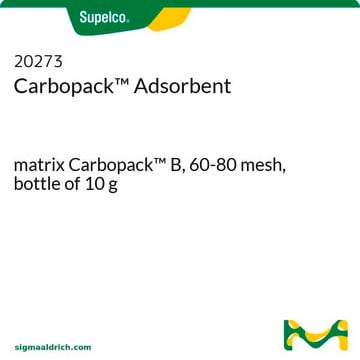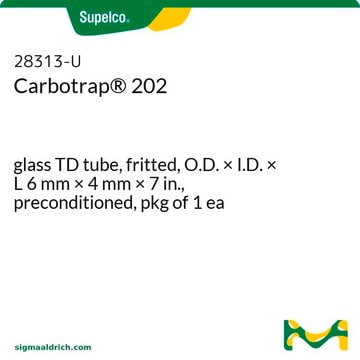28283-U
Carbotrap® 300 Thermal Desorption Tube
glass, O.D. x I.D. x L 6 mm × 4 mm × 7 in., fritted, preconditioned, pkg of 1 ea
Synonym(s):
Carbotrap® 300 glass TD tube, 7 IN, for Gerstel®
About This Item
Recommended Products
product name
Carbotrap® 300, glass TD tube, fritted, O.D. × I.D. × L 6 mm × 4 mm × 7 in., preconditioned, pkg of 1 ea
material
glass TD tube
Quality Level
Agency
EPA TO-17
description
Sealed with TDS³ Storage Container
product line
Carbotrap®
feature
fritted
preconditioned
packaging
pkg of 1 ea
greener alternative product characteristics
Waste Prevention
Safer Solvents and Auxiliaries
Learn more about the Principles of Green Chemistry.
sustainability
Greener Alternative Product
technique(s)
active air sampling: suitable
O.D. × I.D. × L
6 mm × 4 mm × 7 in.
matrix
Carbosieve S-III carbon molecular sieve (CMS)
Carbotrap® 300 (Packed with Carbotrap C, Carbotrap B, Carbosieve SIII)
Carbotrap® B graphitized carbon black (GCB)
Carbotrap® C graphitized carbon black (GCB)
application(s)
air monitoring
environmental
industrial hygiene
compatibility
for use with Gerstel® TDS A & TDS 2
greener alternative category
Looking for similar products? Visit Product Comparison Guide
General description
Legal Information
Storage Class Code
11 - Combustible Solids
WGK
nwg
Flash Point(F)
Not applicable
Flash Point(C)
Not applicable
Choose from one of the most recent versions:
Certificates of Analysis (COA)
Sorry, we don't have COAs for this product available online at this time.
If you need assistance, please contact Customer Support.
Already Own This Product?
Find documentation for the products that you have recently purchased in the Document Library.
Chromatograms
suitable for GC, application for air monitoringOur team of scientists has experience in all areas of research including Life Science, Material Science, Chemical Synthesis, Chromatography, Analytical and many others.
Contact Technical Service






